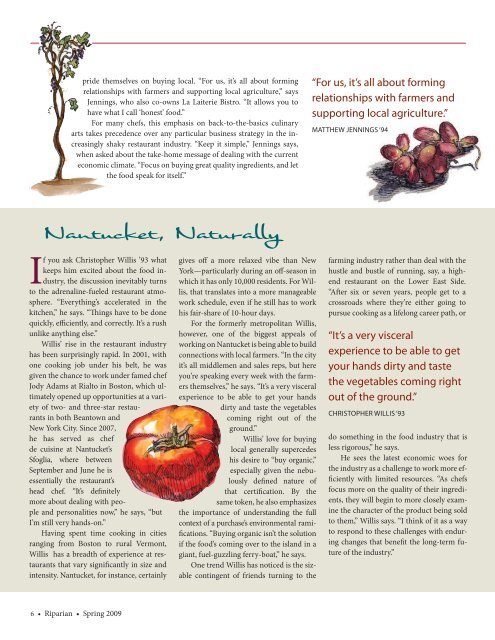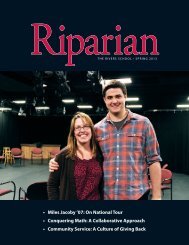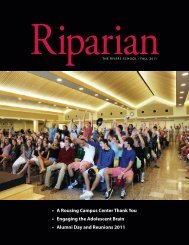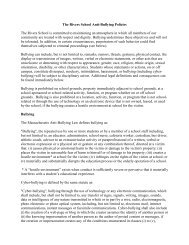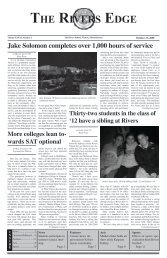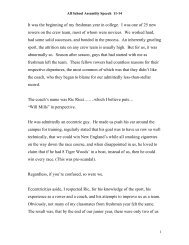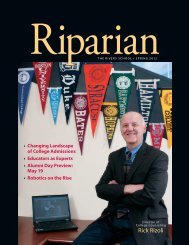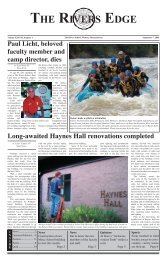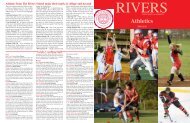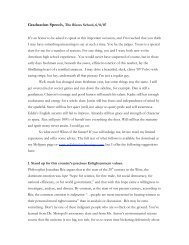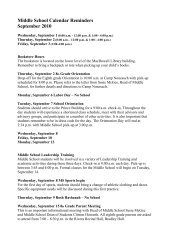You also want an ePaper? Increase the reach of your titles
YUMPU automatically turns print PDFs into web optimized ePapers that Google loves.
pride themselves on buying local. “For us, it’s all about forming<br />
relationships with farmers and supporting local agriculture,” says<br />
Jennings, who also co-owns La Laiterie Bistro. “It allows you to<br />
have what I call ‘honest’ food.”<br />
For many chefs, this emphasis on back-to-the-basics culinary<br />
arts takes precedence over any particular business strategy in the increasingly<br />
shaky restaurant industry. “Keep it simple,” Jennings says,<br />
when asked about the take-home message of dealing with the current<br />
economic climate. “Focus on buying great quality ingredients, and let<br />
the food speak for itself.”<br />
“For us, it’s all about forming<br />
relationships with farmers and<br />
supporting local agriculture.”<br />
Matthew Jennings ‘94<br />
Nantucket, Naturally<br />
If you ask Christopher Willis ’93 what<br />
keeps him excited about the food industry,<br />
the discussion inevitably turns<br />
to the adrenaline-fueled restaurant atmosphere.<br />
“Everything’s accelerated in the<br />
kitchen,” he says. “Things have to be done<br />
quickly, efficiently, and correctly. It’s a rush<br />
unlike anything else.”<br />
Willis’ rise in the restaurant industry<br />
has been surprisingly rapid. In 2001, with<br />
one cooking job under his belt, he was<br />
given the chance to work under famed chef<br />
Jody Adams at Rialto in Boston, which ultimately<br />
opened up opportunities at a variety<br />
of two- and three-star restaurants<br />
in both Beantown and<br />
New York City. Since 2007,<br />
he has served as chef<br />
de cuisine at Nantucket’s<br />
Sfoglia, where between<br />
September and June he is<br />
essentially the restaurant’s<br />
head chef. “It’s definitely<br />
more about dealing with people<br />
and personalities now,” he says, “but<br />
I’m still very hands-on.”<br />
Having spent time cooking in cities<br />
ranging from Boston to rural Vermont,<br />
Willis has a breadth of experience at restaurants<br />
that vary significantly in size and<br />
intensity. Nantucket, for instance, certainly<br />
gives off a more relaxed vibe than New<br />
York—particularly during an off-season in<br />
which it has only 10,000 residents. For Willis,<br />
that translates into a more manageable<br />
work schedule, even if he still has to work<br />
his fair-share of 10-hour days.<br />
For the formerly metropolitan Willis,<br />
however, one of the biggest appeals of<br />
working on Nantucket is being able to build<br />
connections with local farmers. “In the city<br />
it’s all middlemen and sales reps, but here<br />
you’re speaking every week with the farmers<br />
themselves,” he says. “It’s a very visceral<br />
experience to be able to get your hands<br />
dirty and taste the vegetables<br />
coming right out of the<br />
ground.”<br />
Willis’ love for buying<br />
local generally supercedes<br />
his desire to “buy organic,”<br />
especially given the nebulously<br />
defined nature of<br />
that certification. By the<br />
same token, he also emphasizes<br />
the importance of understanding the full<br />
context of a purchase’s environmental ramifications.<br />
“Buying organic isn’t the solution<br />
if the food’s coming over to the island in a<br />
giant, fuel-guzzling ferry-boat,” he says.<br />
One trend Willis has noticed is the sizable<br />
contingent of friends turning to the<br />
farming industry rather than deal with the<br />
hustle and bustle of running, say, a highend<br />
restaurant on the Lower East Side.<br />
“After six or seven years, people get to a<br />
crossroads where they’re either going to<br />
pursue cooking as a lifelong career path, or<br />
“It’s a very visceral<br />
experience to be able to get<br />
your hands dirty and taste<br />
the vegetables coming right<br />
out of the ground.”<br />
Christopher Willis ‘93<br />
do something in the food industry that is<br />
less rigorous,” he says.<br />
He sees the latest economic woes for<br />
the industry as a challenge to work more efficiently<br />
with limited resources. “As chefs<br />
focus more on the quality of their ingredients,<br />
they will begin to more closely examine<br />
the character of the product being sold<br />
to them,” Willis says. “I think of it as a way<br />
to respond to these challenges with enduring<br />
changes that benefit the long-term future<br />
of the industry.”<br />
• Riparian • Spring 2009


